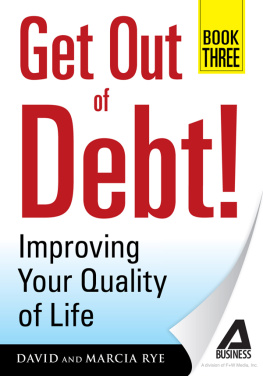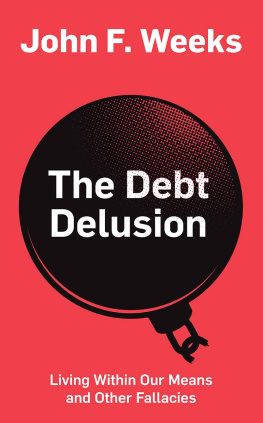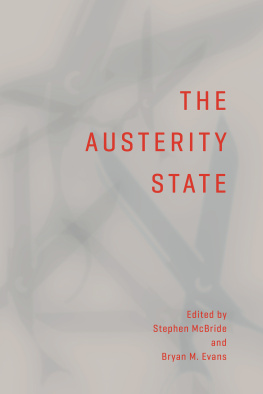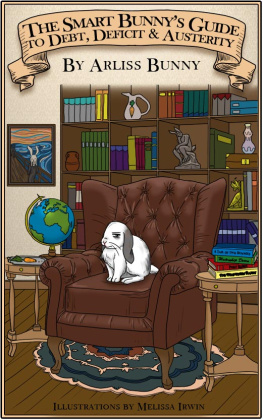AUSTERITY
AUSTERITY
MARK BLYTH
THE HISTORY OF A DANGEROUS IDEA


Oxford University Press is a department of the University of Oxford.
It furthers the Universitys objective of excellence in research, scholarship,
and education by publishing worldwide.
Oxford New York
Auckland Cape Town Dar es Salaam Hong Kong Karachi
Kuala Lumpur Madrid Melbourne Mexico City Nairobi
New Delhi Shanghai Taipei Toronto
With offices in
Argentina Austria Brazil Chile Czech Republic France Greece
Guatemala Hungary Italy Japan Poland Portugal Singapore
South Korea Switzerland Thailand Turkey Ukraine Vietnam
Oxford is a registered trademark of Oxford University Press in the UK and certain other
countries.
Published in the United States of America by
Oxford University Press
198 Madison Avenue, New York, NY 10016
Oxford University Press 2013
All rights reserved. No part of this publication may be reproduced, stored in a
retrieval system, or transmitted, in any form or by any means, without the prior
permission in writing of Oxford University Press, or as expressly permitted by law,
by license, or under terms agreed with the appropriate reproduction rights organization.
Inquiries concerning reproduction outside the scope of the above should be sent to the
Rights Department, Oxford University Press, at the address above.
You must not circulate this work in any other form
and you must impose this same condition on any acquirer.
Blyth, Mark, 1967
Austerity : the history of a dangerous idea / Mark Blyth.
pages cm
Includes bibliographical references and index.
ISBN 9780199828302 (hardback : alk. paper) 1. Debts, Public. 2. Budget
deficits. 3. Financial crises. 4. Economic policy. 5. Fiscal policy. 6. Economic
development. 7. Income. I. Title.
HJ8015.B59 2013
336dc23
2012046882
9 8 7 6 5 4 3 2 1
Printed in the United States of America
on acid-free paper
For Jules
This book has cost you as many hours as it has cost me, possibly more. I really could not have written this without your love and support. Thank you.
CONTENTS
Preface
Austerity, a Personal History
Bankers, Bailouts, and Blaming the State
The Politics of Permanent Austerity
Austeritys Intellectual and Natural Histories
T his book has a rather unusual genesis. David McBride from Oxford University Press emailed me in July 2010 and asked me if I wanted to write a book about the turn to austerity in economic policy. I had been playing with a book idea called the End of the Liberal World for a while but really hadnt been getting all that far with it. Daves offer seemed to be a ready-made alternative project. After all, someone had to write such a book, and since I had, as bankers say, skin in the game here, for reasons I shall elaborate below, I said yes. Shortly thereafter Geoffrey Kirkman, Associate Director of the Watson Institute for International Studies at Brown University, where I am a faculty fellow, wondered if there was anything that I would like to make into a short video. I said yesId do something about this new book that I have agreed to write.
Both of these opportunities arrived shortly after the G20 issued its final communiqu at the end of its June 2010 meeting in Toronto. That G20 meeting marked the moment when the rediscovery of Keynesian economics that had informed state responses to the global financial crisis since 2009 gave way to an economically more orthodox, and austere, reading of events. The G20 communiqu called for an end to re-flationary spending under the guise of something called growth friendly fiscal consolidation, which is a fancy way of saying austerity. I remember thinking at the time thats about as plausible as a unicorn with a bag of magic salt. So when I was afforded the opportunity to make a video, taking on this austerity as a route to growth nonsense seemed the way to go. The video can be seen at http://www.youtube.com/watch?v=FmsjGys-VqA.
Part of what academics do is generate ideas and teach. The other, perhaps more important part, is to play the role of the Bu*l*hit Police. Our job is to look at the ideas and plans interested parties put forward to solve our collective problems and see whether or not they pass the sniff test. Austerity as a route to growth and as the correct response to the aftermath of a financial crisis does not pass the sniff test. The arguments given for why we all must be austere do not pass the sniff test. You will read the full version of why not in this book. The short version became the video. But in shooting the video, the producer Joe Posner forced me to distill what I wanted to say about this topic into five-and-a-half minutes. Once I did that, I went back to the book and wondered if I had anything else to say.
The opportunity to get into more detail and flesh out the argument, the academic rationale, was still there. Both the reasons given for why we all have to be austere (we have spent too much, etc.) and the logics expounded for the supposed positive effects of austerity as a policythat cuts lead to growthare, as we shall see, by and large dangerous nonsense. Yet they remain the governing ideas of the moment. By the time the book is published this may no longer be the case, but in the meantime, these ideas will have wrought tremendous damage.
Part of the reason for this is, as we shall see, ideological. But part of the reason these ideas are so powerful is very material. It has to do with how a too big too fail banking crisis in the United States became a too big to bail banking crisis in Europe, and how this drives us all down the road to austerity. We are, at best, still saving the banks that we started saving in 2008, especially in Europe. This book allowed me to work out why such bad ideas remain the governing ideas, for both ideological and material reasons. But going back to the book after doing the video made me remember another much more personal reason why I should write this book that has to do with the unfairness of austerity as a policy.
I was born in Dundee, Scotland, in 1967, the son of a butcher and a television rental agent (yes, back in the day, TVs were so expensive that most people rented them). My mother died when I was very young, and my care was given over to my paternal grandmother. I grew up in (relative) poverty, and there were times when I really did go to school with holes in my shoes. My upbringing was, in the original sense of the word, quite austere. Household income was a government check, namely, a state retirement pension, plus occasional handouts from my manual-worker father. I am a welfare kid. I am also proud of that fact.
Today I am a professor at an Ivy League university in the USA. Probabilistically speaking, I am as an extreme example of intragenerational social mobility as you can find anywhere. What made it possible for me to become the man I am today is the very thing now blamed for creating the crisis itself: the state, more specifically, the so-called runaway, bloated, paternalist, out-of-control, welfare state. This claim doesnt pass the sniff test. Because of the British welfare state, threadbare though it is in comparison to its more affluent European cousins, I was never hungry. My grandmothers pension plus free school meals took care of that. I never lacked shelter because of social housing. The schools I attended were free and actually acted as ladders of mobility for those randomly given the skills in the genetic lottery of life to climb them.










